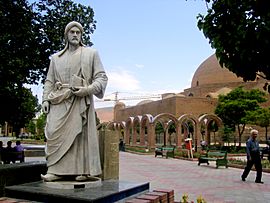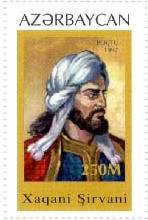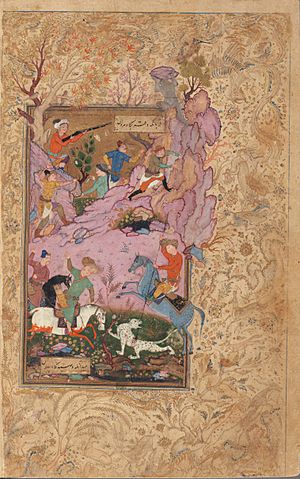Khaqani facts for kids
Quick facts for kids
Khaqani
|
|
|---|---|

|
|
| Native name |
خاقانی
|
| Born | Between 1120 and 1127 Shirvan, Shirvanshahs |
| Died | Between 1186-87 and 1199 Tabriz, Eldiguzids |
| Genre | Habsiyāt (prison poetry) |
| Notable works | Divān, Tohfat al-ʿErāqayn |
Afzal al-Dīn Badīl ibn ʿAlī ibn ʿOthmān, known as Khāqānī (Persian: خاقانی, born around 1120 – died around 1199), was an important Persian poet and writer. He was born in a region called Shirvan in Transcaucasia. There, he wrote special poems called odes for the rulers known as the Shirvanshahs.
Khaqani is most famous for his collection of odes, called Divān. He also wrote an autobiographical travel book called Tohfat al-ʿErāqayn. He is also known for writing a type of poetry called habsiyāt, which means "prison poetry."
Contents
Khaqani's Life Story
Khaqani was born into a family where his father was a carpenter in Shirvan. His mother was a Christian woman who later became Muslim. Khaqani lost his father when he was young. His uncle, Kāfi-al-Din ʿOmar, who was a doctor, raised him. Khaqani even wrote a poem praising his uncle.
Early Talent and Pen Names
Khaqani might have been a child prodigy, meaning he was very talented from a young age. Some of his poems show he started writing when he was still very young. He became a poet who wrote praise poems for the ruler Manuchihr III of Shirvan.
When he was young, Khaqani used the pen name Haqaiʿqi, which means "Seeker." The rulers of Shirvan were called Khaqan. Later, he chose his famous pen name, Khaqani, which means "regal" or "royal."
Travels and Imprisonment
Khaqani wanted to go on a religious journey to Mecca. His ruler, Manuchihr, did not want him to go. On his first try to leave Shirvan, Manuchihr's men caught him. He was put in prison for about 5 to 7 months.
Khaqani was imprisoned several times. But in 1156-57, he finally managed to escape. He then went on a long trip through the Middle East. His travels gave him ideas for his famous book, Tohfat al-ʿErāqayn. This book means A Gift from the Two Iraqs. It talks about western Iran and Mesopotamia. He also wrote a famous ode called The Portals at Madāʾen. This poem talks about the ruins of an old palace and reminds people that even royal power doesn't last forever.
Later Imprisonment and Tragedies
When Khaqani returned, Manuchihr's successor, Akhsitan I, immediately arrested him. To remember his time in prison, Khaqani wrote powerful poems about being held captive. This type of poetry later became known as habsiyāt or "prison poetry." Five of his poems describe his difficult time in prison. One of these, known as the "Christian" qasida, is seen as a very brave poem.
Between 1173 and 1175, Khaqani wrote poems celebrating Shirvan's victory over the Russians. He described where and how the battles happened, including the destruction of 73 Russian ships.
Around this time, Khaqani faced many sad events in his personal life. His first wife died, and then his young son, Rashid-al-Din, also passed away. Khaqani wrote sad poems to express his grief. After this, he went on a second pilgrimage. He then left court life and settled in Tabriz. He died in Tabriz, likely in July 1199.
Khaqani's Works and Influence
Khaqani's main collection of poems, called Divān, includes different types of poems. These are qasidas (poems of praise or other topics), tarjiʿāt (poems with repeating parts), ghazals (love poems), and rubaʿis (four-line poems).
His other famous work, Tohfat al-ʿErāqayn, is a long poem with over three thousand verses. It was originally called Khatm al-gharāʾeb, meaning "Curious Rarities." This book tells his life story and shares his thoughts about the Middle East. He also wrote a prose introduction to this book and about sixty letters.
Christian Connections and Complex Poetry
Khaqani lived in a place where there were also Christians. He made friends with royalty from Byzantine, Armenian, and Georgian areas. His poems sometimes use Christian ideas and symbols. He showed a good understanding of Christianity in his writings.
Many people think Khaqani's poems are hard to understand. They use many rare words, unusual comparisons, and hints about history, astrology, and his own life. Because of this, some have called him "the inaccessible poet." This is different from poets like Saadi, whose poems are much simpler.
Legacy and Impact
Khaqani is considered a very important poet in the Persian language. His "prison poetry" (`habsiyāt`) is thought to be some of the best of its kind. This type of poetry is seen as the most beautiful writing about being in prison from the medieval Islamic world.
He also wrote poems praising Muhammad, which earned him the title Hassān'l-Aʿjam. This means "The Persian Hassān," comparing him to a famous Arabic poet who praised the Prophet Muhammad.
Khaqani was influenced by poets like Omar Khayyám, al-Maʿarri, and Sanai. In turn, his work influenced other great poets such as Nizami Ganjavi, Jami, and possibly Saadi and Hafez. He is remembered as a master of language, a poet with both intelligence and deep feelings, who stands among the greatest in Persian literature.
Images for kids
See also
 In Spanish: Khaqani Shirvani para niños
In Spanish: Khaqani Shirvani para niños
 | Kyle Baker |
 | Joseph Yoakum |
 | Laura Wheeler Waring |
 | Henry Ossawa Tanner |






